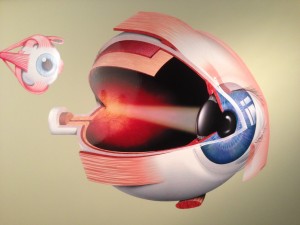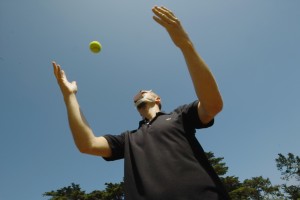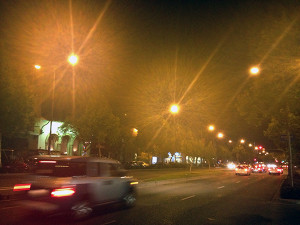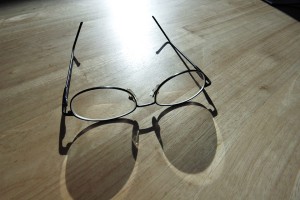There are many risks with any eye surgery, but what about when it comes to LASIK surgery? This eye surgery is often downplayed as a quick 15 minute procedure with minimal risk of complications that only costs a couple thousand dollars. However, we need to ask ourselves whether getting rid of our glasses is really worth the risk of complications that LASIK eye surgery could cause even if they are unlikely?
Anyone reading this could say “You teach natural vision improvement. Of course you’re against LASIK eye surgery!” Which is why, instead of giving you a long list of what could go wrong with LASIK and why you should not touch this type of cosmetic surgery with a 10 foot pole, we are going to share only the four main risks that are most commonly reported to us by our audience and and our clients.
LASIK Eye Surgery Risk 1 – Halos and Glare
There are some people who experience halos and glare at night from street lights and from car headlights etc. This can be due to the pupil not constricting enough, creating a glare effect similar to that of a camera when taking a picture of a light source in the dark. Astigmatism that is not corrected by the surgery can also cause this.
However, there is a percentage of people contacting us who experience halos and glare after the LASIK eye surgery who previously did not experience this. This is more commonly experienced by younger people because their pupils are still flexible enough to fully dilate. When the pupil fully dilates it exposes the surgical incisions that the LASIK procedure causes on the front of the eye (Cornea).
Halos can also be due to the difference in refractive power between the surgically altered portion of the eye and the untouched, natural part of the eye. Unfortunately, even if you are left with seeing halos at night, this is still seen as a successful LASIK surgery by the industry. You will also be told that few people have this problem. In reality it is about 30%.
We suggest dong some personal research first on this “successful” side effect of LASIK and consider carefully if this is a risk you are willing to take. We hear many reports from people that it is highly disturbing to them and can be a particular mental strain at night. We have heard from people who can now no longer drive at night because the halos and glare are too much for them.
You will be told that this is not a serious problem because they can then prescribe drugs to shrink your pupils or you can have more surgery. It is our hope that your common sense will take over at this point. Even most doctors will tell you that prolonged use of any drug can be harmful and having another surgery only increases the chance of more risks.
LASIK Eye Surgery Risk 2 – Dry Eyes
 When you cut into the cornea you are tampering with the intricate design of the eye and you are playing with the mechanisms that create tears. This is why people with chronic dry eyes cannot have LASIK eye surgery.
When you cut into the cornea you are tampering with the intricate design of the eye and you are playing with the mechanisms that create tears. This is why people with chronic dry eyes cannot have LASIK eye surgery.
Fake tears will be prescribed if this occurs. However, your tears perform several very important jobs including adding nutrients, immune protection and improving your acuity and you are much better off producing your own tears naturally. The idea of a 20 year old having to apply fake tears to dry eyes for the next 60 years just doesn’t sound like fun to us.
LASIK Eye Surgery Risk 3 – Complications
Another common complication with LASIK is under-correction or over-correction. Over-correction can be very disturbing for someone who has been nearsighted for most of their life and then after a short procedure has suddenly become farsighted. The LASIK specialist will either recommend a “touch up,” meaning more surgery (and more risks) or they will prescribe a new pair of glasses which of course defeats the main purpose of LASIK.
 There are also more severe complications with LASIK which can involve loss of vision. We could easily write pages of stories of people with very serious complications that have occurred with LASIK like those found on common LASIK websites such as lasikdisaster.com. However, applying a scare tactic is not our aim here and we’re sure that if you’re considering LASIK you will do your own research into the greater risks of LASIK and weigh the pros and cons for yourself before going under the laser.
There are also more severe complications with LASIK which can involve loss of vision. We could easily write pages of stories of people with very serious complications that have occurred with LASIK like those found on common LASIK websites such as lasikdisaster.com. However, applying a scare tactic is not our aim here and we’re sure that if you’re considering LASIK you will do your own research into the greater risks of LASIK and weigh the pros and cons for yourself before going under the laser.
Of course there is a risk of complications with any surgery and we would ask that you consider whether those risks are worth the quick fix of not having to wear glasses for the next 5 years or so?
LASIK Eye Surgery Risk 4 -Wearing Glasses 5 to 10 Years Later
It is no secret that doctors believe that your vision can only get worse as you age. Is the prescription you have in your current glasses the same as you had in your first pair or even your last pair? Typically the answer is no. LASIK is essentially making glasses out of your cornea. What makes you think you will keep this prescription for the rest of your life? Although we have heard of people needing glasses within 6 months of having the LASIK eye surgery, it is much more common for you to need glasses again 5, 10 or 15 years down the road.
Of course LASIK’s answer to this eventuality is another “touch up,” but how many times do think you can shave layers off your cornea? If the answer is “not many,” then how long would it be before you need to wear glasses again, defeating the whole point of LASIK eye surgery in the first place. In the process of which you will be taking all those risks all over again that this surgery has to offer.
LASIK Eye Surgery Risks Summary
Our aim here is not to to scare you off the idea of LASIK eye surgery, but rather  encourage you to consider the risks you are taking before having it done. The idea of a quick and easy fix for anyone, especially when it comes to health, sounds exciting. However, we would encourage you to at least put some serious effort into doing eye exercises for at least six months. See if you notice any improvements before having the surgery. Natural vision improvement offers safer, cheaper and longer lasting benefits than LASIK, but it does take time.
encourage you to consider the risks you are taking before having it done. The idea of a quick and easy fix for anyone, especially when it comes to health, sounds exciting. However, we would encourage you to at least put some serious effort into doing eye exercises for at least six months. See if you notice any improvements before having the surgery. Natural vision improvement offers safer, cheaper and longer lasting benefits than LASIK, but it does take time.
Did this help? Please leave any comments below.




AS we know natural vision improvement offers safer, cheaper and longer lasting benefits than LASIK. Choices are yours. So,SAY NO TO LASIK.
I have not done enough research before LASIK surgery. I got all nasty side effect from LASIK surgery such as halos, starburst, over-correction, and dry eye. I had a nice life and now I am in hell. I wish I could reach out all people and sys don’t do LASIK. LASIK surgeon will put your life in serious risk only for $5,000.